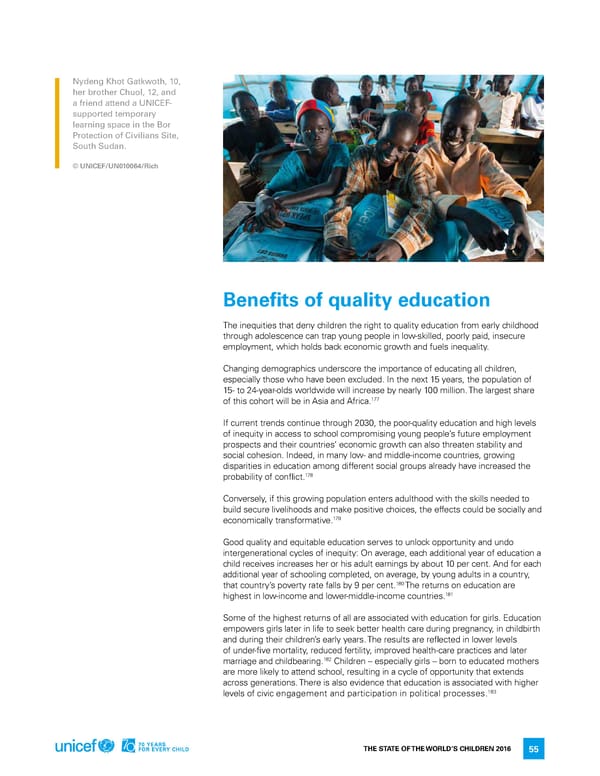Nydeng Khot Gatkwoth, 10, her brother Chuol, 12, and a friend attend a UNICEF- supported temporary learning space in the Bor Protection of Civilians Site, South Sudan. © UNICEF/UN010064/Rich Benefits of quality education The inequities that deny children the right to quality education from early childhood through adolescence can trap young people in low-skilled, poorly paid, insecure employment, which holds back economic growth and fuels inequality. Changing demographics underscore the importance of educating all children, especially those who have been excluded. in the next 15 years, the population of 15- to 24-year-olds worldwide will increase by nearly 100 million. The largest share 177 of this cohort will be in asia and africa. if current trends continue through 2030, the poor-quality education and high levels of inequity in access to school compromising young people’s future employment prospects and their countries’ economic growth can also threaten stability and social cohesion. indeed, in many low- and middle-income countries, growing disparities in education among different social groups already have increased the 178 probability of conflict. Conversely, if this growing population enters adulthood with the skills needed to build secure livelihoods and make positive choices, the effects could be socially and 179 economically transformative. Good quality and equitable education serves to unlock opportunity and undo intergenerational cycles of inequity: on average, each additional year of education a child receives increases her or his adult earnings by about 10 per cent. and for each additional year of schooling completed, on average, by young adults in a country, that country’s poverty rate falls by 9 per cent.180 The returns on education are 181 highest in low-income and lower-middle-income countries. Some of the highest returns of all are associated with education for girls. education empowers girls later in life to seek better health care during pregnancy, in childbirth and during their children’s early years. The results are reflected in lower levels of under-five mortality, reduced fertility, improved health-care practices and later marriage and childbearing.182 Children – especially girls – born to educated mothers are more likely to attend school, resulting in a cycle of opportunity that extends across generations. There is also evidence that education is associated with higher levels of civic engagement and participation in political processes.183 The STaTe of The World’S Children 2016 55
 70 Years for Every Child Page 70 Page 72
70 Years for Every Child Page 70 Page 72